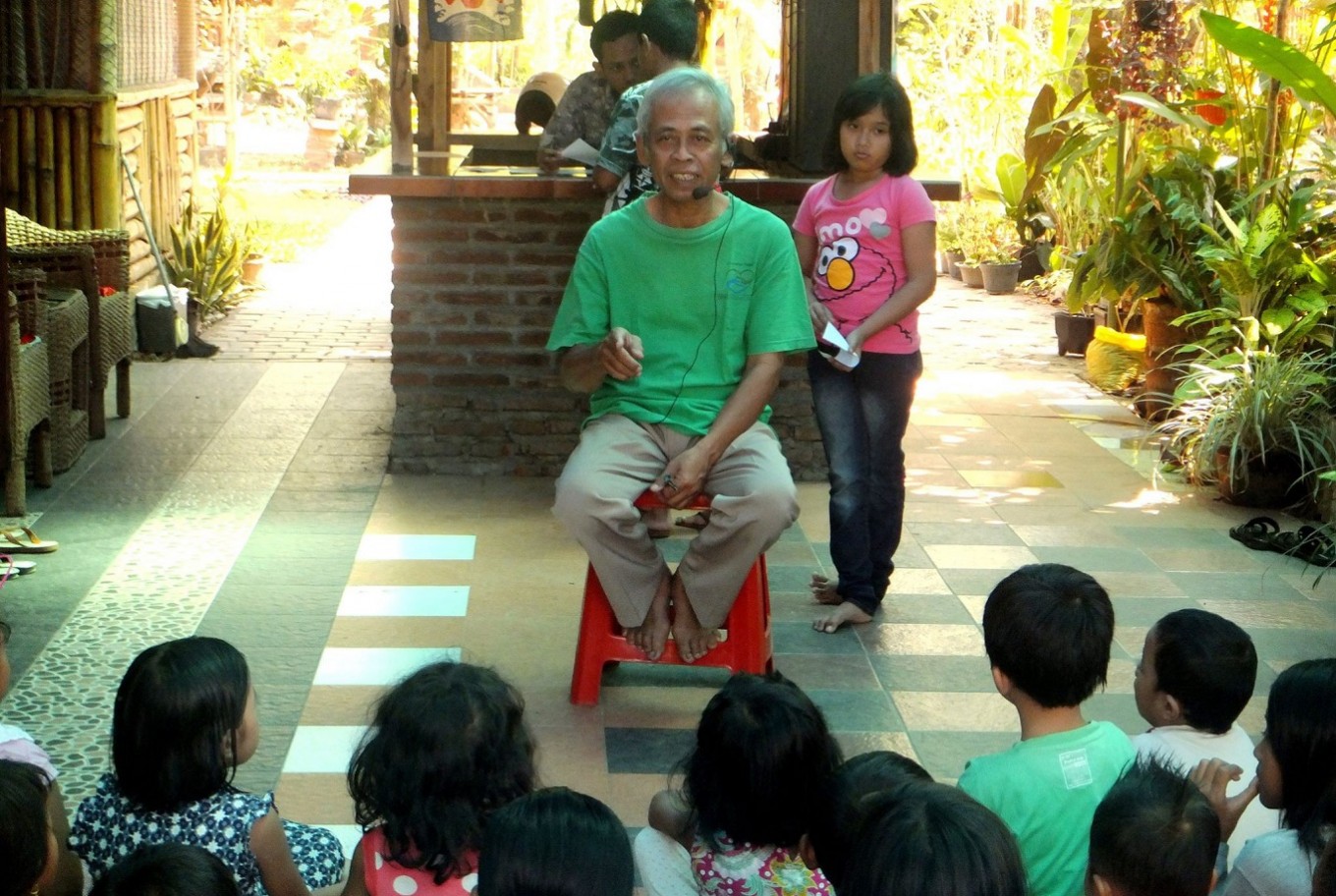Popular Reads
Top Results
Can't find what you're looking for?
View all search resultsPopular Reads
Top Results
Can't find what you're looking for?
View all search resultsIman Suligi: Literary hero for children
Teacher Iman Suligi has no plans to hang up his boots when it comes to improving literacy in the country.
Change text size
Gift Premium Articles
to Anyone
L
ong before the government launched Indonesia’s Reading Movement in 2015, retired teacher Iman Suligi established foundation Indonesia Membaca (Indonesia Reading) in Jember, East Java, with the same mission: eliminating illiteracy.
When former culture and education minister Anies Baswedan launched the national movement in Jember on Dec. 19 last year, Iman felt proud because he had initiated a similar movement some decades ago.
“Through this foundation, we want to develop people’s passion for reading and writing to expand their horizon as well as to improve their quality of life,” Iman said.
Back then, Anies said the number of illiterate people in Jember decreased from 180,000 in 2014 to 45,000 in 2015. Despite the great improvement, the figure was larger than that of other cities in East Java.
According to the ministry, the number of illiterate people in the country decreased from 14.9 million people in 2005 to 5.6 million in 2015, including 1.4 million in East Java.
Indonesia is ranked second-lowest of 61 measurable countries for its “literate behavior characteristics” according to Central Connecticut State University’s recent study. Meanwhile, the United Nations Development Program (UNDP) reported that only one out of 1,000 Indonesians is passionate about reading.
Iman admitted that poor reading habits were still a serious problem in Jember, home to 2.3 million people. That is why he will strive to improve the quality of education in the city.
In 1983, the 66-year-old man opened a public library in Jember and in 2009, he transformed it into a reading park named Kampoeng Batja (Reading Village). While finding a public library is relatively easy in the city, attracting visitors is another challenge.
With the help of 11 volunteers, Iman makes various attractive programs, such as an archery practice activity, to attract potential readers to his reading park. This effort has been fruitful.
(Read also: Struggling with stress? Consider exercising, study says)
In 2014, former education minister M. Nuh awarded Kampoeng Batja as a creative reading park.
On a recent afternoon, despite the hard rain, a number of children visited his park to practice archery. Iman taught them with great patience to fire arrows from a bow in the backyard. They would burst into laughter every time their shots missed the target.
“This sport is good to train their [ability to] focus and to improve their upper body strength,” said the grandfather of 11.
After the archery session, they moved to a library-style living room where books were neatly arranged in bookshelves. Each of them took different books and then read them either on the floor or in a nearby gazebo.
Iman also utilizes social media to attract people to develop their writing skills. On his Facebook account, for example, he has a project called Puisi Keroyokan (Collaborative Poetry) to attract his followers to work together to create poems.
On his wall, he posts poetry themes and then asks his friends to alternately write at least two sentences related to it in a comments column. He then collects and combines their works to form a collaborative poem.
“Now, there are more than 70 collaborative poems since 2010 and they have been published in two books, namely Kaleidoskop [Kaleidoscope] and Jendela Hati [Window of the Heart],” he said.
Iman works passionately when it comes to spreading the love for reading books. In early 1990, he ran a mobile library, riding a motorcycle to visit one home after another to facilitate people who wanted to read books. Before the era of social media, he teamed up with state-owned postal company Pos Indonesia to boost children’s writing habits.
In 1995, for example, his foundation held an Indonesian writing competition titled Menulis Surat untuk Walikota (Writing a Letter to the Mayor) to attract children to express what they wanted from the Jember administration by writing it in warkat pos (postcard-like paper).
The idea to use warkat pos popped up when he observed that the item was hard to sell at that time. “At a post office, its number reached 3,000 sheets and they were unsold,” he said.
One of the children, Iman recalled, asked for a playground in alun-alun (town square) in front of the city hall. He was over the moon after the mayor granted that wish shortly after the competition.
Iman also runs the Sudut Batja (Reading Corner) program to develop children’s reading habits. In the program, he provides a free package comprising books, a bookshelf and a carpet. Literacy activists, students who want to have a home library and schools or communities can contact him if they want to get the package. He will later verify whether they qualify for the free package.
“Since June, we have given out four packages. We will send another four soon,” he said.
Iman says he donates his books because he has more than enough in his library, which shelves 3,500 books, ranging from textbooks, comics and novels to pop-up books.
“I think the interest in reading books is high, but the problem lies in the access to get them,” said Iman, who dreams of transforming his library into a literacy museum.
Danish writer Katrine May Hansen, who visited Kampoeng Batja in September, commended Iman for his contributions in advancing education in the country for 38 years.
“Iman is a very sweet and considerate man. He does a lot for local culture, especially for children. I do believe that education and curiosity are the keys to make peace in the world and he really contributes to this movement in a very positive way,” she said.











